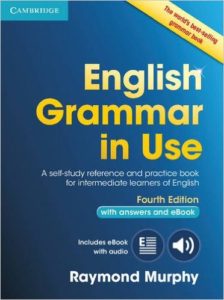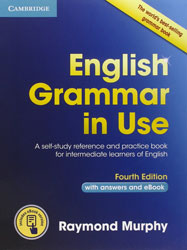English Grammar in Use(イングリッシュ・グラマーインユース)で英語を勉強すると、なにが身につくのかというのを、もう少し掘り下げて具体的に示してみます。
English Grammar in Useは全145ユニット(ユニット一覧を記事の最後に掲示)で構成されています。
全てのユニットが重要なのは間違いないのですが、その中でも特に重要なユニットがあります。「ここをしっかり理解しておかないと、使える英語が身につかない」というパートです。すべて中学や高校の英語で習っている内容ばかりなのですが、多くの日本人が実践でほとんど使いこなせていない部分です。
ここでは、そういう項目を厳選して紹介します。これからEnglish Grammar in Useを始める人は、この部分から始めてみて、今まで習った自分の英語と比べてみるのもオモシロイでしょう。
ただしこの記事では、あくまで最重点箇所をピックアップしたにすぎませんので、最終的には全ユニットもれなく目を通してください。全てのユニットに実践英語のエッセンスが詰まっていますので。
Unit7~10 – 現在完了
「現在完了」はもちろん学校で習うのですが、結局、これをしっかり理解している人は多くないと思います。なぜなら、現在完了は英語独特の表現で、それをキチッと日本語で説明されてきていないのです。そもそも「現在完了」という言葉自体、ものすごく曖昧な表現です。
ユニット7~10を何度も読めば、ネイティブがどういう感覚で現在完了を使うか理解できます。この項目を読めば、必ず新たな気付きがあります。
Unit13~16 – 現在完了と過去形、過去完了
上のユニットの続きですが、結局のところ、現在完了と過去形の違いが理解できてない人が多いんです。「現在完了と過去形は全く別物なんだよ」と教わるのですが、違うというところだけ頭に残っていて、根本的なニュアンスの違いがわからずいつまでも曖昧なままになっているのです。
ユニット13~16を読めばココを理解できます。現在完了の感覚が理解できれば、過去完了も同じです。
Unit19 – 現在時制の未来活用
~ingの未来を意味する活用法についてです。これは受験英語でも少し習います。実際の日常会話でも頻出ですので、この使い方は習得必須です。
Unit23 – willとbe going to
willとbe going to、どちらも未来を意味する表現ですが、この使い分け方をしっかり理解できている人はあまりいません。どちらも未来を意味するからということで、全てをwillで済ませて会話する人も多いです。でも、しっかり違いを理解して、使い分けれると自然な英語になります。
もちろん、相手に言いたいことは伝わります。ただ、これは日常英会話では基本中の基本ですので、ワンランクアップするにはしっかり理解しておきたいところです。
Unit38 – if I doとif I did
日本語の英文法書でいうところの「仮定法」です。過去を意味しない「過去形」の使い方の説明があります。これに続くユニットで、仮定法の色んなパターンの説明が丁寧に解説されています。
Unit26~36 – Modals(助動詞)
will・would・can・could・may・might・must・have (got) to・shall・should
これらをModalsと呼びます。日本語では助動詞といわれています。これらの正確なニュアンスと使い分けの感覚をじっくり学べます。これらをマスターすると英会話での表現力が格段に違いが出てきます。
Unit69~80 – aとthe 単数/複数
英語の授業で一番最初に習うのに、何年たってもその感覚を理解できないのが、a/theや単数/複数の使い分けです。理屈は理解できていると思うのですが、結局のところ冠詞や複数形は日本語にない感覚なので、数をこなして慣れていかないと身につかない部分が大きいです。
この10ユニットで徹底的に解説してくれているので、大量の演習問題をこなして自分のモノにするべきです。
Unit137~145 – フレイザル・バーブ(句動詞)
このパートはかなり大事です。
ネイティブが日常で使う単語というのは、「簡単な動詞+前置詞」が圧倒的に多いのです。これらをphrasal verb(フレイザル・バーブ)というのですが、これを知らないことには日常会話は聞き取れません。
日本人の頭の中にある受験で習った英単語というのは、結構「お硬い(フォーマルな)言葉」が多いのですが、そういう単語は日常会話では出てきません。もちろんネイティブは知っているのですが、「普段では使わない単語」なのです。日本語でも同じですが、日常会話で「恐縮です」、「遺憾である」、「言及する」なんて使いませんよね。使う単語のレベルが違うのです。
フレイザル・バーブは、まさに日常会話で使われる言葉なのです。この10ユニットで山ほど掲載されています。これでも、まだ足りないんですけどね。
English Grammar in Useユニット一覧
最後に、English Grammar in Useのユニット一覧を掲載しておきます。上で挙げた最重要ユニットは、オレンジでハイライトしています。ムリに日本語に当て込むのは好きではないので、あえて和訳していません。ご了承ください。
Present and past
1 Present continuous (I am doing)
2 Present simple (I do)
3 Present continuous and present simple 1 (I am doing and I do)
4 Present continuous and present simple 2 (I am doing and I do)
5 Past simple (I did)
6 Past continuous (I was doing)Present perfect and past
7 Present perfect 1 (I have done)
8 Present perfect 2 (I have done)
9 Present perfect continuous (I have been doing)
10 Present perfect continuous and simple (I have been doing and I have done)
11 How Long have you (been) … ?
12 For and since When … ? and How Long … ?
13 Present perfect and past 1 (I have done and I did)
14 Present perfect and past 2 (I have done and I did)
15 Past perfect (I had done)
16 Past perfect continuous (I had been doing)
17 Have and have got 18 Used to (do)Future
19 Present tenses (I am doing I I do) for the future
20 (I’m) going to (do)
21 Will/shall 1
22 Will/shall 2
23 I will and I’m going to
24 Will be doing and will have done
25 When I do I When I’ve done When and ifModals
26 Can, could and (be) able to
27 Could (do) and could have (done)
28 Must and can’t
29 May and might 1
30 May and might 2
31 Have to and must
32 Must mustn’t needn’t
33 Should 1
34 Should 2
35 Had better lt’s time …
36 Would
37 Can/Could/Would you … ? etc. (Requests, offers, permission and invitations)If and wish
38 If I do … and If I did …
39 If I knew… I wish I knew …
40 If I had known … I wish I had known …
41 WishPassive
42 Passive 1 (is done I was done)
43 Passive 2 (be done I been done I being done)
44 Passive 3
45 lt is said that … He is said to … He is supposed to …
46 Have something doneReported speech
47 Reported speech 1 (He said that … )
48 Reported speech 2Questions and auxiliary verbs
49 Questions 1
50 Questions 2 (Do you know where … ? I He asked me where … )
51 Auxiliary verbs (have/do/can etc.) I think so I I hope so etc.
52 Question tags (do you? isn’t it? etc.)-ing and to …
53 Verb+ -ing (enjoy doing I stop doing etc.)
54 Verb+ to … (decide to … I forget to … etc.)
55 Verb(+ object)+ to … (I want you to … etc.)
56 Verb+ -ing or to … 1 (remember/regret etc.)
57 Verb+ -ing or to … 2 (try/need/help)
58 Verb+ -ing or to … 3 (Like I would Like etc.)
59 Prefer and would rather
60 Preposition (in/for/about etc.)+ -ing
61 Be/get used to something (I’m used to … )
62 Verb + preposition + -ing (succeed in -ing I accuse somebody of -ing etc.)
63 Expressions+ -ing
64 To … , for … and so that …
65 Adjective+ to …
66 To … (afraid to do) and preposition+ -ing (afraid of -ing)
67 See somebody do and see somebody doing
68 -ing clauses (Feeling tired, I went to bed early.)Articles and nouns
69 Countable and uncountable 1
70 Countable and uncountable 2
71 Countable nouns with a/an and some
72 A/an and the
73 The 1
74 The 2 (school I the school etc.)
75 The 3 (children I the children)
76 The 4 (the giraffe I the telephone I the piano etc., the + adjective)
77 Names with and without the 1
78 Names with and without the 2
79 Singular and plural
80 Noun+ noun (a tennis ball I a headache)
81 -‘s (your sister’s name) and of … (the name of the book)Pronouns and determiners
82 Myself/yourself/themselves etc.
83 A friend of mine My own house On my own I by myself
84 There … and it …
85 Some and any
86 No/none/any Nothing/nobody etc.
87 Much, many, Little, few, a Lot, plenty
88 All I all of most I most of no I none of etc.
89 Both I both of neither I neither of either I either of
90 All, every and whole
91 Each and everyRelative clauses
92 Relative clauses 1: clauses with who/that/which
93 Relative clauses 2: clauses with and without who/that/which
94 Relative clauses 3: whose/whom/where
95 Relative clauses 4: extra information clauses (1)
96 Relative clauses 5: extra information clauses (2)
97 -ing and -ed clauses (the woman talking to Tom, the boy injured in the accident)Adjectives and adverbs
98 Adjectives ending in -ing and -ed (boring/bored etc.)
99 Adjectives: a nice new house, you look tired
100 Adjectives and adverbs 1 (quick/quickly)
101 Adjectives and adverbs 2 (well/fast/Late, hard/hardly)
102 So and such
103 Enough and too
104 Quite, pretty, rather and fairly
105 Comparison 1 (cheaper, more expensive etc.)
106 Comparison 2 (much better I any better I better and better I the sooner the better)
107 Comparison 3 (as … as I than)
108 Superlatives (the Longest, the most enjoyable etc.)
109 Word order 1: verb+ object; place and time
110 Word order 2: adverbs with the verb
111 Still/ yet and already Any more I any Longer I no Longer
112 EvenConjunctions and prepositions
113 Although I though I even though In spite of I despite
114 In case
115 Unless As Long as Provided/providing 11 6 As (As I walked along the street … I As I was hungry … )
117 like and as
118 Like I as if I as though
119 For, during and while 120 By and until By the time …Prepositions
121 At/on/in (time)
122 On time and in time At the end and in the end
123 In/at/on (position) 1
124 In/at/on (position) 2
125 In/at/on (position) 3
126 To/at/in/into
127 In/on/at (other uses)
128 By
129 Noun+ preposition (reason for, cause of etc.)
130 Adjective+ preposition 1
131 Adjective+ preposition 2
132 Verb+ preposition 1 to and at
133 Verb+ preposition 2 about/for/of/after
134 Verb+ preposition 3 about and of
135 Verb+ preposition 4 of/for/from/on
136 Verb+ preposition 5 in/into/with/to/onPhrasal verbs
137 Phrasal verbs 1 General points
138 Phrasal verbs 2 in/out
139 Phrasal verbs 3 out
140 Phrasal verbs 4 on/off (1)
141 Phrasal verbs 5 on/off (2)
142 Phrasal verbs 6 up/down
143 Phrasal verbs 7 up (1)
144 Phrasal verbs 8 up (2)
145 Phrasal verbs 9 away/backAppendix
Appendix 1 Regular and irregular verbs
Appendix 2 Present and past tenses
Appendix 3 The future
Appendix 4 Modal verbs (can/could/will/would etc.)
Appendix 5 Short forms (I’m I you’ve I didn’t etc.)
Appendix 6 Spelling
Appendix 7 American English






